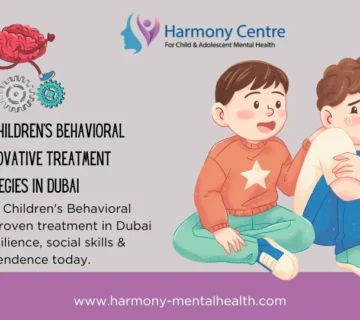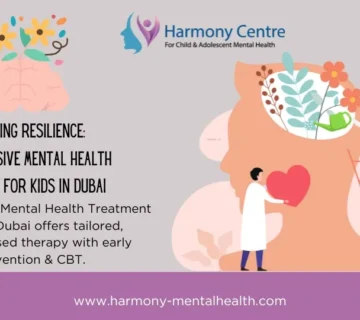Child Behavior Issues Dubai: Managing Challenging Behaviors with Expert Strategies at Harmony Centre
Explore effective strategies for addressing child behavior issues in Dubai at Harmony Centre. Our multidisciplinary approach supports positive behavior and overall well‑being.
Contact Information
| Contact Method | Details |
|---|---|
| Phone | +971 (52) 8773268 / 04 558 2015 |
| Click Here | |
| info@harmony-mentalhealth.com | |
| Address | Office 409, Building Alrazi-64C, 26th St, Healthcare City, Dubai |
Introduction
In a bustling city like Dubai, children often face a variety of behavioral challenges that can affect their learning, social interactions, and overall quality of life. At Harmony Centre Mental Health Dubai, we understand that addressing child behavior issues early is essential for fostering a supportive and positive environment. Our evidence‑based, multidisciplinary approach provides families with practical strategies to manage defiance, tantrums, and other challenging behaviors. By partnering with parents, educators, and community resources, we create a consistent support system that empowers children to develop positive behavior and thrive.
Learn More About Harmony Centre • Contact Us
Understanding Child Behavior Issues
What Are Child Behavior Issues?
Child behavior issues refer to patterns of disruptive or challenging behaviors that interfere with a child’s ability to function effectively in daily life. These may include defiance, frequent tantrums, aggression, or noncompliance. Such behaviors are often a way for children to express underlying emotional distress or unmet needs.
Common Behavior Challenges
- Defiance and Noncompliance:
Resistance to following rules or instructions, often seen as challenging authority. - Tantrums and Meltdowns:
Intense outbursts that may include crying, screaming, or physical aggression. - Aggressive Behavior:
Hitting, biting, or other forms of physical aggression that disrupt social interactions. - Impulsivity:
Acting without thinking, which can lead to risky or inappropriate behavior. - Withdrawal:
Avoidance of social interactions or activities as a response to stress or frustration.
Factors Contributing to Behavior Issues
Several factors may contribute to child behavior issues:
- Emotional Stress:
Anxiety, depression, or stress can manifest as disruptive behavior. - Environmental Influences:
Inconsistent parenting, high academic pressure, or exposure to conflict at home or school. - Developmental Challenges:
Delays or difficulties in cognitive and emotional development can lead to frustration and acting out. - Social and Peer Influences:
Negative peer pressure or bullying may trigger defensive or aggressive behaviors. - Lack of Effective Coping Skills:
Children who have not learned healthy strategies for managing emotions are more likely to display challenging behaviors.
The Impact of Child Behavior Issues
Academic Consequences
Behavioral challenges can significantly hinder a child’s academic progress:
- Disrupted Learning:
Frequent outbursts and noncompliance may lead to missed lessons and reduced concentration. - Strained Relationships:
Negative interactions with peers and teachers can result in social isolation and diminished academic support. - Lower Academic Achievement:
Ongoing behavioral issues often correlate with lower grades and reduced school engagement.
Social and Emotional Effects
Beyond academics, unresolved behavior issues affect a child’s emotional health:
- Low Self‑Esteem:
Persistent negative feedback and social rejection can erode self‑confidence. - Increased Anxiety and Depression:
Emotional distress may escalate into chronic anxiety or depressive symptoms. - Impaired Social Skills:
Challenges in behavior can prevent children from developing healthy, supportive relationships. - Family Stress:
Ongoing behavioral conflicts at home can create a tense environment that affects the entire family.
Long-Term Implications
If left unaddressed, behavior issues in childhood can persist into adolescence and adulthood, leading to challenges in employment, relationships, and overall quality of life. Early intervention is critical to altering these trajectories and setting the stage for long-term success.
Our Approach at Harmony Centre
Comprehensive Behavioral Assessments
At Harmony Centre, our first step is a thorough assessment to understand the unique behavioral challenges your child faces.
Initial Consultation
- Family History Review:
We gather detailed information about your child’s developmental milestones, previous behavioral concerns, and family dynamics. - Parental and Educator Feedback:
Insights from parents, teachers, and caregivers are essential to understanding the context of the behavior. - Preliminary Screening:
A brief initial assessment helps pinpoint key issues that require more detailed evaluation.
Standardized Testing and Observations
- Validated Assessment Tools:
We use scientifically‑validated instruments to measure cognitive, emotional, and behavioral functioning. - Direct Observations:
Our clinicians observe your child in both structured settings and natural environments to capture authentic behavior. - Collaborative Input:
Comprehensive feedback from all stakeholders provides a holistic view of your child’s challenges.
Learn More About Our Assessment Process
Multidisciplinary Team Review
Collaborative Analysis
Our multidisciplinary team, including child psychologists, psychiatrists, occupational therapists, and educational specialists, meets to review the collected data.
- Interdisciplinary Meetings:
Regular team discussions ensure every perspective is considered. - Diagnostic Profile Creation:
We compile a detailed profile that outlines your child’s strengths and areas needing intervention. - Goal Setting:
Clear, measurable objectives are established to guide the treatment process.
Culturally Sensitive Considerations
- Respect for Diversity:
Our evaluations and interventions are tailored to align with the cultural values of Dubai’s diverse community. - Language Support:
We offer multilingual services to ensure clear and effective communication with families from various backgrounds.
Personalized Treatment Planning
Based on our comprehensive assessments, we create a customized treatment plan that addresses your child’s specific behavioral challenges.
Tailored Therapeutic Interventions
- Individual Therapy:
One‑on‑one sessions provide a safe space for your child to explore emotions and develop effective coping strategies using techniques such as Cognitive Behavioral Therapy (CBT) and play therapy. - Family Counseling:
Involving the family helps create a supportive home environment and reinforces positive behavior. - Group Therapy:
Peer group sessions allow children to share experiences, learn social skills, and build confidence through guided interactions. - Specialized Programs:
Depending on the assessment, additional interventions such as occupational therapy or social skills training may be integrated.
Goal Setting and Monitoring
- Short‑Term Objectives:
Immediate goals may focus on reducing specific behaviors such as defiance or tantrums. - Long‑Term Aspirations:
Broader objectives aim at overall emotional stability, improved social interactions, and academic success. - Continuous Monitoring:
Regular follow-up sessions and digital tracking ensure the treatment plan is dynamic and responsive to progress.
Benefits of Addressing Child Behavior Issues
1- For Your Child
- Improved Emotional Regulation:
Effective therapy helps children manage their emotions, reducing outbursts and frustration. - Enhanced Social Skills:
Structured group activities and peer interactions build better communication and interpersonal relationships. - Academic Success:
With reduced behavioral disruptions, children can focus more on their studies, leading to improved academic outcomes. - Increased Self‑Confidence:
Positive reinforcement and gradual progress build a child’s self-esteem and encourage independent problem‑solving.
2- For Families
- Empowerment Through Knowledge:
Understanding your child’s behavioral challenges enables you to support them more effectively. - Strengthened Family Bonds:
Family counseling fosters open communication and creates a supportive home environment. - Reduced Stress:
With a clear plan in place, the anxiety associated with managing challenging behaviors is significantly alleviated.
3- For Educators and the Community
- Consistent Support:
Insights from therapy inform classroom strategies and individualized education plans (IEPs), ensuring that children receive comprehensive support. - Improved Classroom Dynamics:
Addressing behavioral challenges enhances the overall learning environment, benefiting all students. - Community Engagement:
Collaborative efforts between families, educators, and mental health professionals create a network of support that promotes overall well‑being.
Practical Strategies for Success
For Families
Create a Structured, Supportive Home Environment
- Establish Consistent Routines:
Use visual schedules to create predictable daily routines that reduce uncertainty and anxiety. - Encourage Open Communication:
Foster an atmosphere where your child feels safe discussing their emotions and challenges. - Implement Positive Reinforcement:
Reward and praise your child for displaying positive behavior, even for small improvements. - Engage in Joint Activities:
Participate in family activities such as board games, sports, or creative projects that promote teamwork and positive social interaction.
Reinforce Therapeutic Techniques at Home
- Practice Daily Exercises:
Incorporate therapeutic exercises recommended by your child’s therapist into your daily routine. - Keep a Behavior Journal:
Document your child’s behaviors, progress, and any triggers to share with the therapist for ongoing adjustments. - Stay Informed:
Educate yourself on child behavior management strategies through reputable sources and parent workshops.
For Educators
Foster a Positive Learning Environment
- Implement Social‑Emotional Learning (SEL):
Integrate SEL curricula into your classroom to help students develop emotional regulation and interpersonal skills. - Designate Quiet Zones:
Create areas in the classroom where students can retreat to calm down and refocus. - Encourage Group Collaboration:
Organize group projects and interactive activities that promote cooperation and reduce isolation. - Regular Communication:
Collaborate with parents and mental health professionals to ensure that classroom strategies align with therapeutic goals.
Monitor and Support Student Progress
- Digital Monitoring:
Utilize digital tools to track behavioral improvements and academic performance. - Feedback Mechanisms:
Provide regular, constructive feedback to help students understand their progress and areas for improvement. - Professional Development:
Engage in training sessions on behavior management and child psychology to stay updated on best practices.
For the Community
Participate in Public Awareness Initiatives
- Attend Workshops:
Join community seminars and workshops focused on child behavior management and mental health. - Engage with Support Networks:
Connect with local parent groups and online forums to share experiences and effective strategies. - Advocate for Quality Care:
Support public campaigns that promote access to integrated, evidence‑based mental health services for children.
Utilize Digital Resources
- Telehealth Services:
Access virtual consultations and follow‑up sessions for continuous support and expert guidance. - Online Educational Tools:
Leverage digital platforms that offer interactive content, such as webinars, articles, and video tutorials on child behavior management.
Explore Our Digital Resources
Get in Touch
Frequently Asked Questions about Child Behavior Issues Dubai
Book a Consultation Now
Contact Information
Office Address:
Office 409, Building Alrazi-64C, 26th St, Umm Hurair 2, Dubai Healthcare City, Dubai
Phone:
+971 4 558 2015
+971 5 287 73268
Email:
info@harmony-mentalhealth.com
Final Thoughts about Child Behavior Issues Dubai
Addressing child behavior issues early is crucial for setting the foundation for lifelong success. At Harmony Centre Mental Health Dubai, our comprehensive, evidence‑based approach provides the tools, support, and personalized care necessary to help children overcome behavioral challenges and thrive in all aspects of life. By working closely with families, educators, and community partners, we create a supportive environment that fosters positive change, improved academic performance, and better social interactions.
Invest in your child’s future with expert guidance from Harmony Centre—your trusted partner in nurturing resilient, well‑adjusted young minds in Dubai.
Learn More About Harmony Centre
Get in Touch
👉 Book a Consultation Now: Call +971 4 558 2015 or visit www.harmony-mentalhealth.com.
Join our online community and stay updated with our latest events, articles about Child Behavior Issues Dubai



